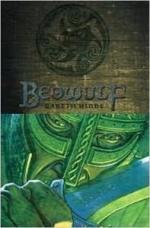That
in it did perish. He early swam off then
60 Who had
bided in combat the carnage of haters,
Went
up through the ocean; the eddies were cleansed,
The
spacious expanses, when the spirit from farland
His
life put aside and this short-lived existence.
The
seamen’s defender came swimming to land then
65 Doughty
of spirit, rejoiced in his sea-gift,
The
bulky burden which he bore in his keeping.
The
excellent vassals advanced then to meet him,
To
God they were grateful, were glad in their chieftain,
That
to see him safe and sound was granted them.
70 From
the high-minded hero, then, helmet and burnie
Were
speedily loosened: the ocean was putrid,
The
water ’neath welkin weltered with gore.
Forth
did they fare, then, their footsteps retracing,
Merry
and mirthful, measured the earth-way,
75 The highway
familiar: men very daring[3]
Bare
then the head from the sea-cliff, burdening
Each
of the earlmen, excellent-valiant.
{It takes four men to carry Grendel’s head on a spear.}
Four
of them had to carry with labor
The
head of Grendel to the high towering gold-hall
80 Upstuck
on the spear, till fourteen most-valiant
And
battle-brave Geatmen came there going
Straight
to the palace: the prince of the people
Measured
the mead-ways, their mood-brave companion.
The
atheling of earlmen entered the building,
85 Deed-valiant
man, adorned with distinction,
Doughty
shield-warrior, to address King Hrothgar:
[57] Then hung by the hair, the head of Grendel
Was
borne to the building, where beer-thanes were drinking,
Loth
before earlmen and eke ’fore the lady:
90 The warriors
beheld then a wonderful sight.
[1] ‘Þaes monige geweareth’ (1599) and ‘hafaeth þaes geworden’ (2027).—In a paper published some years ago in one of the Johns Hopkins University circulars, I tried to throw upon these two long-doubtful passages some light derived from a study of like passages in Alfred’s prose.—The impersonal verb ‘geweorethan,’ with an accus. of the person, and a þaet-clause is used several times with the meaning ‘agree.’ See Orosius (Sweet’s ed.) 178_7; 204_34; 208_28; 210_15; 280_20. In the two Beowulf passages, the þaet-clause is anticipated by ‘þaes,’ which is clearly a gen. of the thing agreed on.
The first passage (v. 1599
(b)-1600) I translate literally: Then many
agreed upon this (namely),
that the sea-wolf had killed him.
The second passage (v. 2025
(b)-2027): She is promised ...; to this
the friend of the Scyldings
has agreed, etc. By emending ‘is’
instead
of ‘waes’ (2025),
the tenses will be brought into perfect harmony.




